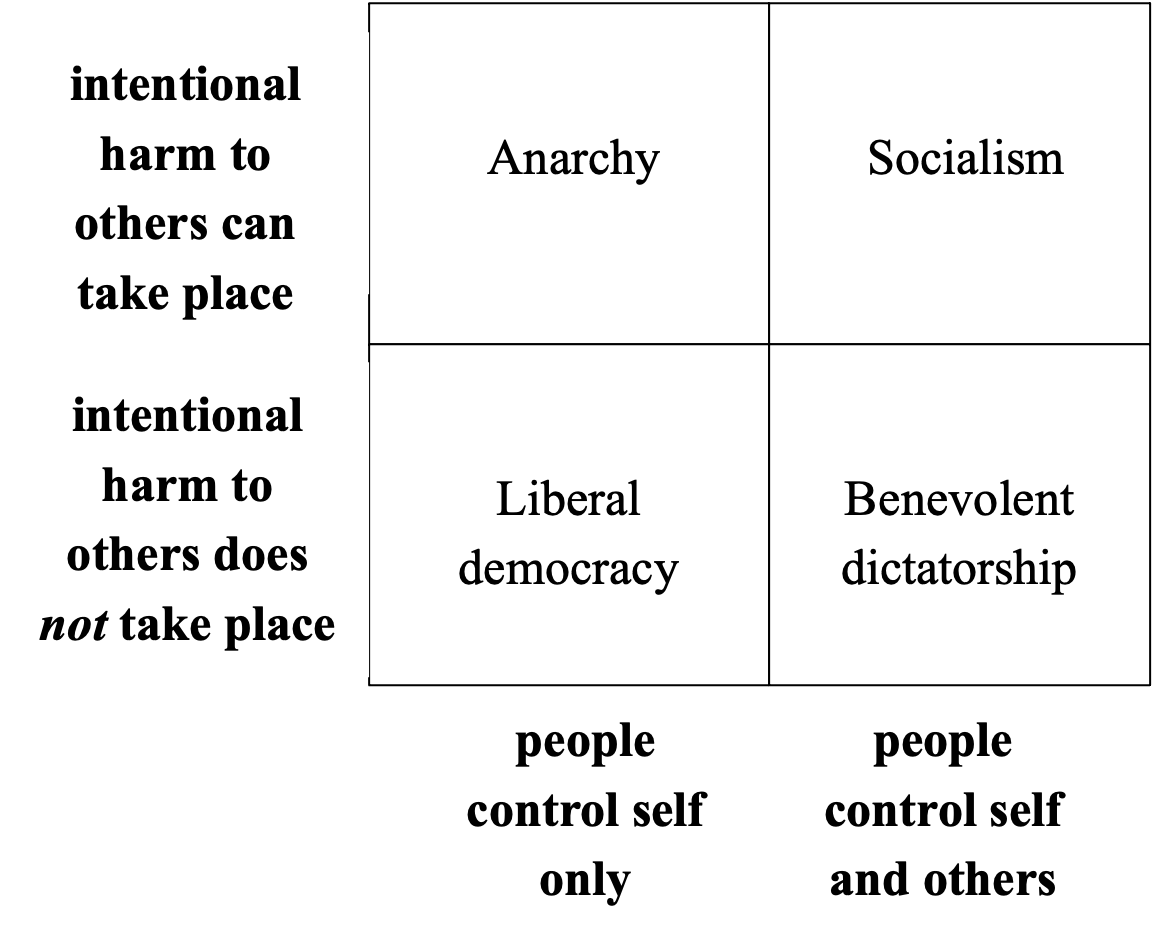Some argue that the terrain of political philosophy can be presented on a single dimension based on extent of liberty, ranging from pure liberty, or anarchy, at one end of a spectrum, and absence of liberty due to control by government (e.g., socialism, fascism, communism) at the other. It follows from such an argument that liberty can be sustained by reducing the size of government, perhaps to zero.
However, I suggest that instead of addressing solely the size of government, we should consider first the role of government.
Thankfully, the terrain of political philosophy can be described without using the term 'liberty'. Elizabeth Davison[1] gives this crisp overview of present thinking:
"Classical liberal philosophy holds that every individual has the right to act without interference (negative right), subject only to the duty not to harm or interfere with others (negative duty). In contrast, socialist philosophy holds that individuals have positive rights, such as to health and education, and that these positive rights can be satisfied when others comply with positive duties imposed on them."
Armed with the two distinct constructs indicated in Elizabeth’s overview, 'rights' and 'duties', business management consultants may attempt to arrange political relationships in a 2x2 box:
Though the constructs 'rights' and 'duties' are distinct from each other, presenting them as parameters in a two-dimensional box exposes an empty top left-hand corner. This corner is empty because a positive right can only be satisfied if there is a corresponding positive duty imposed on another person. In other words, the constructs are not completely independent of each other. Another difficulty is that these two constructs are rather abstract, perhaps suited to a logical (non-empirical) analysis, and they are difficult to understand in terms of observable behaviours of humans who strive for survival.
Nevertheless, this rights-and-duties arrangement already indicates a need for the existence of rules for sustaining either Liberal democracy or Socialism. For example, Liberal democracy requires rules for preventing interference, and Socialism requires rules for enforcing positive duties.
To overcome these difficulties, we need to identify a pair of constructs that are both independent of each other (orthogonal) and are relatable to observable human behaviour. I propose 'intentional harm' and 'control'.
The role of 'intentional harm' is well established in political philosophy. For example, John Stuart Mill[2] expressed the view that the "... only purpose for which power can rightfully be exercised over any member of a civilised community, against his will, is to prevent harm to others. His own good, either physical or moral, is not sufficient warrant".
Second, ‘extent of control’ is independent of intentional harm and seems likely to be a useful differentiator between possible forms of government.
Thus, a 2x2 box can be constructed for framing the terrain of different forms of government if the rights parameter is shifted to an 'intentional harm' dimension, and the duties parameter is shifted to a 'control' dimension[3]:
Are these new constructs, harm and control, relatable to observable human behaviour? I offer the view that people naturally act as individual agents in an open complex system to maximise their individual benefit per personal effort[4]. In such a system, people can be observed harming or controlling others to varying extents.
To be consistent with a liberal democratic form of government, control would be limited to self. While controlling self only, such benefit-per-effort maximising individuals may enhance their benefit by cooperating in groups, for example a business company or indeed a government. So, in this view, liberal democratic government can be seen as a group formed by self-controlling benefit-maximising individuals with the role of limiting the extent to which a person is allowed to control or harm others.
If we decide to limit harm, we must define it. And if we include harm to property, quickly we move to justifying enabling laws such as for ownership of property. And if we decide to limit control of others, we move to justifying enabling laws for contracts between people. Soon after that, we can justify governance for interactions between groups through regulatory frameworks, and governance of individual groups through constitutions.
And in a trice between the Charter of Liberties in 1100 and the election of Margaret Thatcher in 1979, despite a few harsh tests, liberal democracy can be born and fledged.
Nevertheless, while a socialist government for controlling social and economic behaviour needs to be large, a liberal democratic government for enabling free benefit-maximising individuals to maximise their benefit per effort is likely to be small.
[1] E. Davison, English solicitor, moral philosopher, and advocate for free speech
[2] 'On Liberty', J.S. Mill, published in 1859. Quoted in 'Sin and Status, A Tale of Anglo-American Criminal Justice'. J.H Pain. Published by Athens Press in 2007 https://www.bookdepository.com/Sin-and-Status-J-H-Pain/9781844019410
ISBN13: 978-1-84401-941-0, ISBN10: 1-84401-941-1
[3] Here, the meaning of 'intentional harm to others does not take place' is related to the meaning of 'no right to cause harm'; and the meaning of 'people control self only' is related to the meaning of 'no positive duty to control others'.
[4] from page 3 of: https://www.researchgate.net/publication/365349529_AN_ENDOGENOUS_SOURCE_OF_NOVELTY_FOR_PROMPTING_UNEVEN_PROFITS_AMONG_FIRMS.






OK, thank you ... I'll take that as yet another prompt to finish reading that book!
Here is a film about a dystopian bid for government power through the central banks:
https://live.childrenshealthdefense.org/chd-tv/events/the-great-taking-film-premiere/great-taking-film-premiere-event/